Saltwater Pools vs. Chlorine Pools: Which One Is Right for You?
Saltwater and chlorine are two of the most common pool systems. Learn about the pros and cons of each and discover some new alternatives to both.
Pools are made up of many parts but it's the sanitization systems that keep the water clean and healthy. Saltwater and chlorine systems are two of the most common pool systems, but how do you determine which one is right for you? Take a look at the advantages and disadvantages of each, plus explore some new technology in pool systems.

Design Imaging Studios
How Saltwater Pools Work
Contrary to what some might think, saltwater systems are not chlorine-free. When you opt for a saltwater or saline pool, your pool’s filtering system comes with a chlorine generator. You add pool-grade salt to the water and the generator converts the salt into chlorine, which is then sent back out to the pool to sanitize the water. In the end, even with a saltwater pool you are swimming in chlorinated water — but it’s a lot less chlorine than you would have with a traditional chlorine system. The water will have a softer quality than water in chlorine pools.
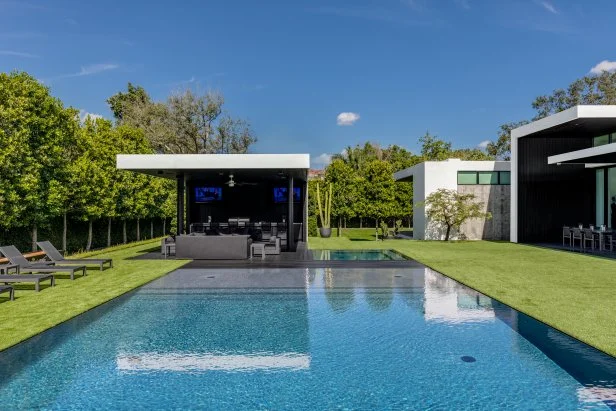
Lifestyle Production Group
Saltwater Pros
There are several pros to a saltwater swimming pool system, mainly due to the decreased amount of chemicals needed.
Fewer Harsh Chemicals
One of the major benefits of saltwater systems is that they have significantly lower levels of chlorine than traditional chlorine systems and don’t require harsh chemicals. As a result, the water is gentler on your skin, eyes and hair, and it does not fade swimwear or towels the way that chlorine pools do. This might appeal to avid swimmers or parents who wish to avoid exposing children to chlorine. Saltwater pools also do not have the chlorine scent that some people dislike.
Lower Maintenance
In addition to health factors, saltwater pools are much lower maintenance than chlorine systems and thus more user-friendly. You don't need algaecides because the system naturally helps prevent algae from growing on the walls or in the water. The chlorine generator does the work for you. “Saltwater pools require less maintenance since the chlorine generator will provide a slow introduction of chlorine versus using traditional chlorine methods that can cause a drastic increase of chlorine at one time,” says Stewart Vernon, COO and founder of America’s Swimming Pool Company. “You will still need to use balancing chemicals, but this will be less compared to using traditional chlorine.”
Cheaper to Maintain
Pool-grade salt also costs a lot less than chlorine and other chemicals that are needed for chlorine pools. So when it comes to day-to-day maintenance, saltwater systems are both easier and cheaper to maintain.
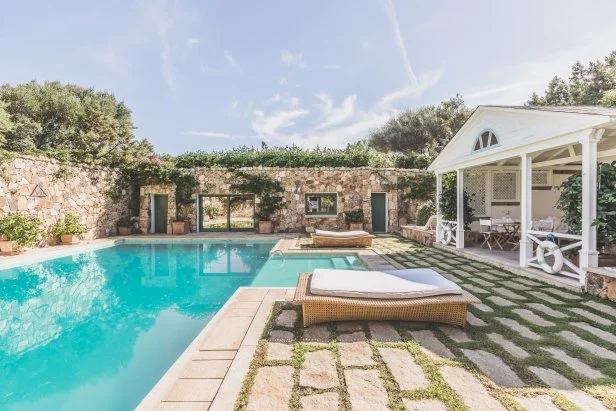
Immobilsarda, a member of Luxury Portfolio International
Saltwater Cons
Saltwater pools offer a better swimming environment, and while it might feel better on the skin and does not cause eye irritation, it's not without problems.
Saltwater is Corrosive
Saltwater is corrosive to metal and tends to corrode any metal objects near the pool such as outdoor furniture and even nearby grills. The salt also corrodes natural stone, so any paving made of natural materials near the pool that gets splashed will eventually break down unless it's properly sealed to keep out the water. Discuss the pros and cons with your pool professional but know that not every pool company recommends using a salt system. If you do decide to invest in a saltwater pool, remember that some pool parts and components might be made of materials that are susceptible to corrosion from salt, such as pool heaters, ladders, diving boards and handrails. Vinyl pools are often designed with metal walls that may experience saltwater corrosion, and plaster finishes on concrete pools may also be susceptible to saltwater. Fiberglass pools are the most resistant to wear and tear from saltwater exposure.
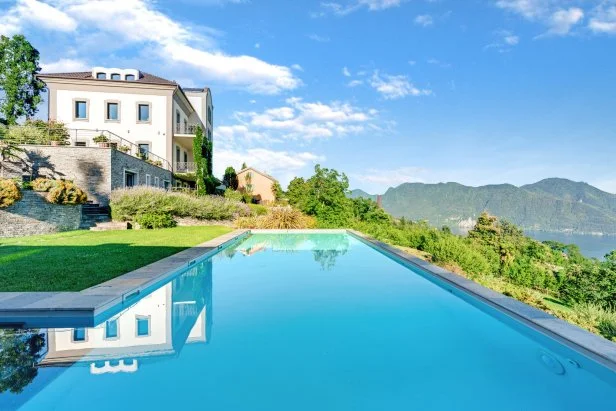
High Upfront Costs
While there are many cost benefits to maintaining a saltwater pool, the upfront costs are significant compared to chlorine pools. Purchasing and installing a chlorine generator can cost anywhere from $500 to $2,000 and up, and the equipment will likely need to be replaced in three to seven years. Repairing a chlorine generator can also get pricey, as you will need a licensed professional to handle repairs rather than taking a DIY approach.
Increased Energy Bills
Another long-term cost to keep in mind is that you will have to run your pool filter 24/7 to generate enough chlorine to clean the pool water. This will increase your energy bills.
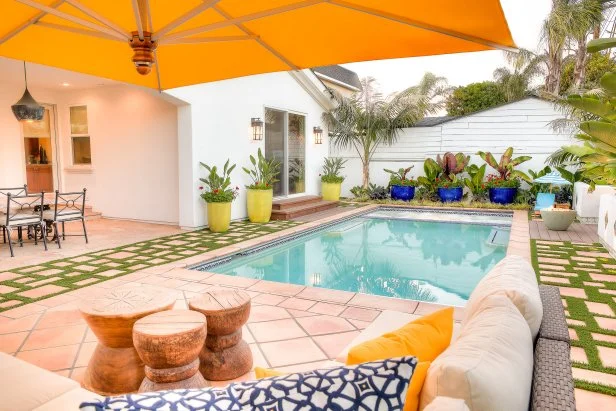
Warwick P Hunt
How Chlorine Pools Work
Chlorine systems rely on larger amounts of chlorine to sanitize your pool water. Unlike saltwater systems, which convert salt into chlorine, chlorine systems require that you manually add store-bought chlorine to the water. Chlorine systems must be tested once or twice a week to maintain the proper chemical balance in your water. These tests measure pH levels, alkalinity and levels of sanitizers like chlorine and bromine. You will need to regularly add chlorine and other chemicals depending on the chemical balance.
Chlorine Pros
With lower upfront costs and non-corrosive elements, chlorine systems are appealing to many.
Fewer Upfront Costs
Chlorine systems have very few upfront costs compared to saltwater systems. There is no need to purchase expensive equipment such as a chlorine generator, and you can perform all water tests and chemical balancing on your own without the need for a professional. “For a chlorine pool, it is inexpensive to install an inline or offline chlorinator that houses the chlorine tablets, or simply put them inside a floating chlorinator,” says Brian Farrell, franchise owner from Pinch a Penny in Mansfield, Texas. Chlorine systems are also fairly straightforward compared to saltwater systems, which rely on a complex chlorine generator, so it’s easier to perform DIY maintenance.
Not Corrosive
Unlike saltwater systems, which cause corrosion to metal over time, chlorine does not cause any major damage to pool parts. This means you won’t need to worry about replacing components due to corrosion down the line.
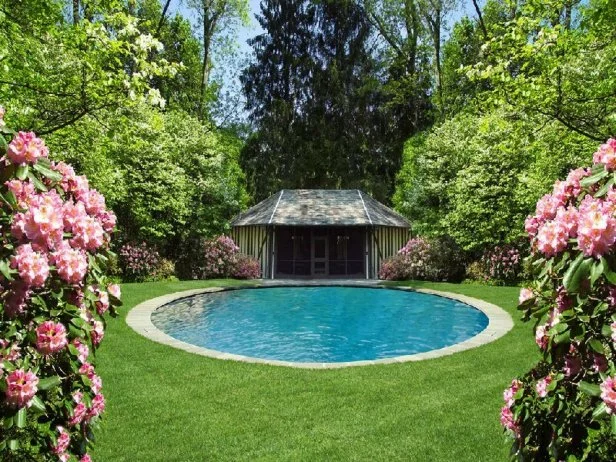
Chlorine Cons
While there are benefits to a chlorine system, there are also things to be aware of regarding the chemicals needed to keep a clean and sanitary swimming pool.
Irritating Chemicals
Chlorine pools rely on chemicals to keep the water sanitized and some of these chemicals come with certain health risks. Chlorine is known to irritate your skin, eyes and throat, and it can dry out skin and bleach swimwear. Some people simply dislike the smell of chlorine.
Buying and Checking Chemicals
While there are no major upfront costs to a chlorine system, chlorine pools require buying a steady supply of chlorine and other chemicals to balance your pool chemistry. This can add up over time, more so than the cost of salt for saltwater pools. You will also need to handle the chemicals when adding them to the pool, which may be unappealing to people who prefer avoiding exposure to harsh chemicals. Owners may also find maintaining a chlorine pool to be more cumbersome since you must perform weekly tasks such as checking the chemical balance, adding chlorine tablets and “shocking” the pool.
Chemical Storage
Another factor to keep in mind is that chlorine must be stored in a safe location, which may be especially tricky for people with young children or limited space.
Other Pool Systems

UV System
If you’re looking for options beyond saltwater and chlorine systems, you may want to consider a UV system to sanitize your pool. This system relies on UV bulbs to kill bacteria, algae and viruses in your water. It still requires some chlorine to help with sanitization, but it’s a lot less than a traditional chlorine pool. The UV light is housed in a chamber to eliminate direct exposure, so you don’t need to worry about harmful UV effects. The reduced presence of chemicals makes this a better choice when it comes to health risks, but you will need to pay upfront costs to install the UV system.
Ozone System
Another option is an ozone system, which uses ozone gas to destroy bacteria, viruses and other contaminants. The system is typically used in tandem with chlorine or saltwater systems, but it requires fewer chemicals and less overall maintenance. However, you will need to invest in some equipment upfront and you also need to ensure the ozone gas is properly contained to avoid direct exposure.
How Much Does It Cost to Install an In-Ground Pool?
The cost of installing an in-ground swimming pool will vary depending on the construction materials, shape and amenities. Here are the biggest factors to keep in mind when calculating the costs of an in-ground pool, including maintenance and winterizing. Plus, discover some of the latest pool trends.
50 Patio Design Ideas 51 Photos
A patio is a great way to add extra living space and increase your home’s value. Find patio design inspiration and practical tips from professional builders on how to create the backyard of your dreams.







.jpg.rend.hgtvcom.91.91.suffix/1644351843853.jpeg)



































